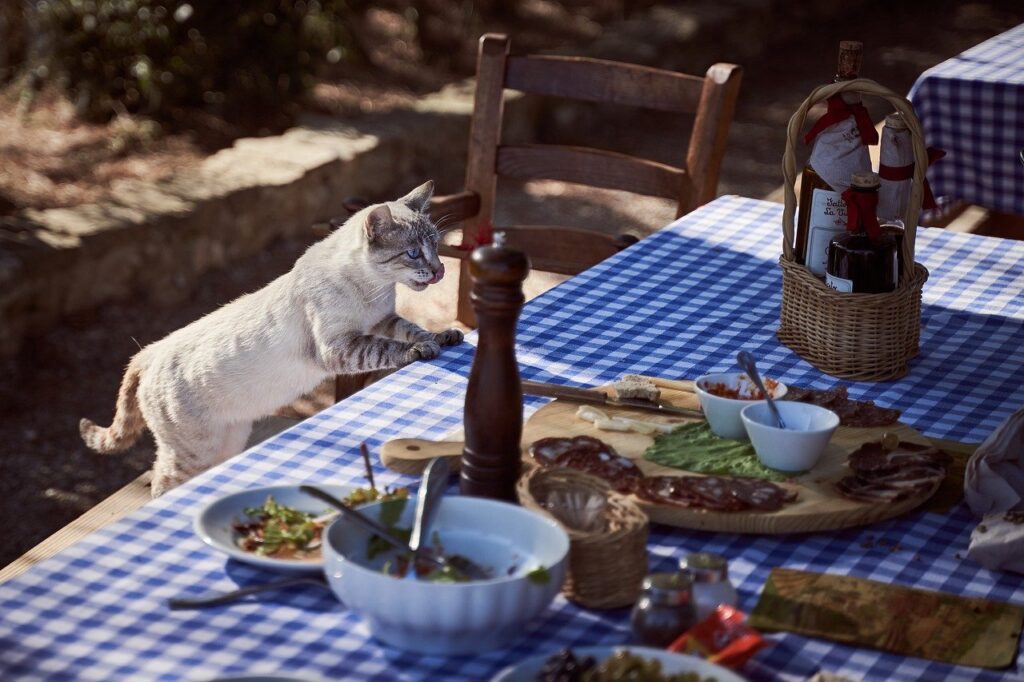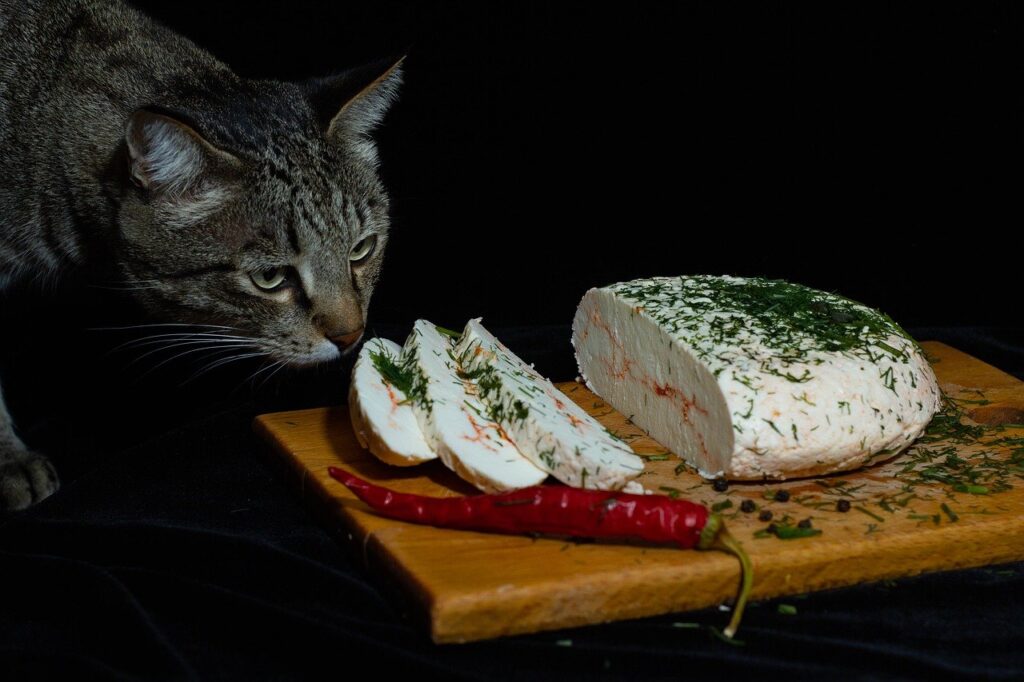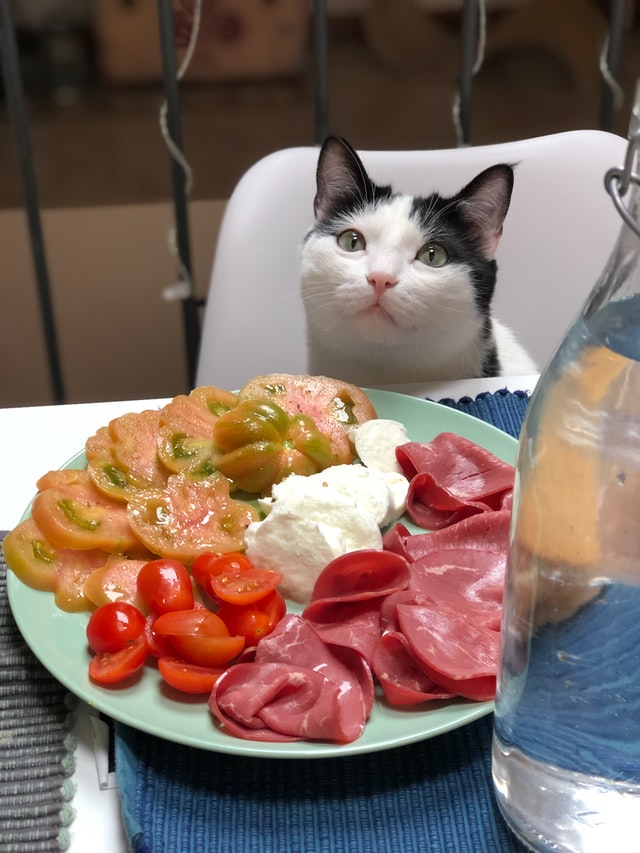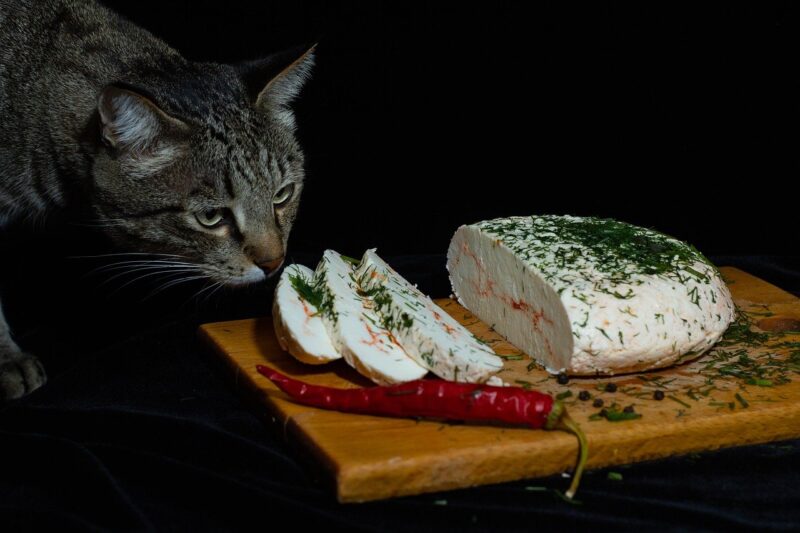Cats do not taste sweetness but this does not stop them from exploring human foods.
As a cat parent, you want to treat your feline friend with occasional treats. But you should be aware of the foods that can pose threats to your furry kid.
Your cat’s diet should be nutritionally balanced, and it can include occasional treats only up to a smaller amount. You can take help from a vet nutritionist; to formulate a specific diet for your feline.

Which Human Foods Are Toxic to Cats?
Though some human foods can add nutritional value to your feline’s diet, you need to be aware of the human foods that can be toxic to your furry kid.
If you are a first-time pet parent, you may have several doubts before feeding your furry kid. To help you, I have come up with this article, so check out the human foods cats cannot eat below.
Here are 17 foods you should avoid feeding your cat to keep them free from trouble.

1. Chocolate
Humans find chocolate a delicious treat made of cocoa, but it can turn toxic to your cats due to theobromine and caffeine.
So never treat your cat with chocolate such as milk and dark. And it can cause severe symptoms such as vomiting, increased body temperature, rapid breathing, seizures, and diarrhea.
Cats are less likely to taste chocolate, but you should be careful to store your chocolates securely. Especially dark chocolates may turn fatal to your feline due to more cocoa content in them.
If you find your furry pet eating chocolate, immediately call your vet since high exposure to caffeine and theobromine can cause heart failure or even coma in cats.
2. Raw eggs
The raw egg whites contain a protein named avidin. Feeding your feline with raw eggs can inhibit Vitamin B absorption in your cat. And that leads to skin allergies and dull skin.
Also, raw eggs contain salmonella or E.coli, which can cause vomiting and lethargy in cats.
While cooking, the egg alters the enzyme structure (avidin), and it becomes harmless, so, you can feed your cat with cooked egg without any concern.
3. Raw meat
Like raw eggs, raw meat can also turn toxic to your felines. Since raw meat contains dangerous E.coli and salmonella bacteria, it can cause your cat to experience vomiting, diarrhea, and stomach upsets.
The consumption of raw meat can even turn fatal to your furry kid, so make sure to keep the raw meats away from your cat.
Also, the clinical nutrition service mentions that they could see gastrointestinal disturbances in cats who are consuming raw meat diets.
Read also: Can I give my cats raw fish?
4. Onions and garlic
Onions and garlic that belong to the allium family can cause anemia in your felines. It does not matter whether the onion is raw, powdered, cooked, dehydrated, or blended form; it can damage your feline’s red blood cells.
Though eating a little bit of onion does not trigger symptoms in your cats, but make sure your feline’s diet is free of allium family members.
Feeding onions and garlic can cause abdominal pain in cats, including, nausea, vomiting, and diarrhea. Also, eating certain kinds of onion for a long time can cause anemia.
Call your vet immediately if your cat is mistakenly given onions, chives, shallots, or garlic since the allium family contains thiosulphate, which causes red blood cell destruction. It can also lead to hemolytic anemia.
Remember that cats are curious pets, and they love to explore unattended food. So you should not place any toxic cat foods on your kitchen countertop. And it is better to keep it in sealed pantry doors.
5. Bread and yeast
A cat can eat bread as an occasional treat, which does not contain nutritional value for your feline.
But do not feed raw dough that contains yeast since yeast dough can rise in your feline’s digestive system, causing gas build-up. Sometimes, the cat may require surgery if the dough gets expanded in its stomach.
Stomach bloating can even turn fatal to your kitty. However, baked bread can be given as a rare treat, but you should not replace it with your cat’s diet.
6. Coffee, tea, and energy drinks
You might need coffee as a day refreshment, but your furry kid does not require that.
Hot beverages such as caffeine, tea, and other energy drinks can make your feline restless, with increased heart rates, excessive breathing, and seizures. Especially, caffeine toxicity can bring harm to your cat.
Also, the raw coffee grounds and tea bags are not exposed to your cats’ sight since they can potentially threaten your feline.
7. Alcohol
Alcohol can cause severe problems to your feline’s health. Even a small amount of alcohol can cause enough destruction to your cat. So you need to be extra cautious while giving new foods and ensure they do not contain alcohol.
Below are the symptoms caused due to alcohol consumption in cats.
- Digestive upset
- Coma
- Breathing troubles
- Disorientation
- Death
Always do not leave any alcohol unattended in your home. Also, you ensure to keep it away from your cat’s reach.
8. Grapes and raisins
Do not feed grapes and raisins to your cat since it can lead to kidney failure in your feline. Also, grapes can cause diarrhea, vomiting, and other serious illness. So immediately reach out to your vet if your kitty accidentally eats any grapes or raisins.
9. Nuts
Generally, nuts are not recommended for the cat since they can upset digestion in cats. Also, nuts such as macadamia, almonds, pecans, and walnuts are rich in fats, and oil can cause pancreatitis in the feline.
So save the nuts for yourself and keep them away from your furry friend.
10. Salt
Although small amounts of salt do not cause any harm, feeding your cat with large amounts of salt can cause vomit, tremors, seizures, and diarrhea.
So always make sure you monitor the sodium levels in your feline’s diet.
11. Tuna
Every cat enjoys tuna but makes it a rare treat for your feline. Since feeding more tuna can cause mercury poisoning. Also, do not give raw tuna as it contains harmful bacteria that lead to food poisoning.
132. Coconut
Coconut products such as coconut milk, and the flesh can disrupt your feline’s digestive system. Do not worry if coconut milk is ingested by your cat in small amounts; since it would not cause any major harm.
Coconut water has more potassium levels, so, make sure your cat’s diet does not include coconut.
13. Liver
The liver is an excellent source of iron, protein, and other nutrients, but, do not include them in your feline’s regular diet. Too much of liver can end up building fat cells within your cat’s body.
Including more liver in your cat’s diet can cause hypervitaminosis and high levels of vitamins in your furry kid.
Always make sure your kitty’s diet is balanced with nutrients to keep your furry kid healthy.

14. Bones
Bones from chicken, turkey and other poultry can cause serious damage to your cat. Feeding small bones to your feline can result in oral and digestive tract issues.
15. Xylitol
Xylitol is an artificial sweetener present in sugar-free treats such as chewing gums. It is not recommended for any pets since it can lower blood sugar, causing seizures and death.
So always, carefully review the ingredients before you feed your cat any pet treats.
16. Citrus fruits
In general, do not give any seeds, stems, or peels of any fruit to your feline since it contains trace amounts of cyanide and can be fatal to your cat.
You should avoid feeding lemons, oranges, and grapefruits when it comes to citrus fruits. Even small amounts can worsen your kitty’s condition, such as diarrhea, vomiting, and nausea.
Read also our article about fruits for your beloved cats
What should you do if you find your cat eating toxic food?
If you find your cat eating harmful human food, contact your vet immediately and provide complete details. Do not wait for any symptoms since earlier is better.
If you see any adverse reactions in your cat after eating a specific food, immediately rush to emergency pet care.
Though some human foods are toxic, quantities of the food consumed by your cat are also essential for your vet. Smaller quantities may not require urgent treatment, so try to figure out the amount of food your furry kid eats. So it can help your vet diagnose the problem and provide the necessary treatment.
Also, the treatment involves hospitalization, IV drips, and a few blood tests to monitor your cat’s organ function.
Can I give my cat shrimp as their diet?
What about cheese?
How to prevent cats from eating toxic foods?
The simplest way to avoid this is to keep your food out of your cat’s reach.
Follow these rules if you decide to feed your cat human food:
- Feed occasional foods only during occasions; do not replace those foods as a supplement in your feline’s diet.
- Cats explore every food available in your home. So keep the unsafe cat foods in a closed pantry.
- Do not give any raw food to your feline that you would not eat.
- If your children leave any chocolate or chewing gums at your home, there are chances that your feline may eat it. So you need to monitor your cat and keep your home out of food spills.
What are the safe human foods to consume by your cat?
As per clinical nutrition service, numerous human foods are considered safe for cats as long as they do not exceed 10% of cats’ daily intake. A healthy cat can consume 25 calories from other food sources if it consumes 250 calories daily.
Even safe foods can cause adverse reactions in your cat, so the amount of food you include in your feline’s diet is equally important.
Each cat is different since some felines do not develop any symptoms of eating a specific food, whereas others may suffer diarrhea, nausea, and food poisoning. So, checking with your vet before including any new human foods in your furry cat’s diet is better.
Final Thought
As a pet parent, you want to keep your kitty healthy by giving a nutritious diet. But it does not mean your cat needs human food to stay active.
Also, before making any changes to your feline’s diet, consult with your vet. If you like to introduce human foods, ensure you differentiate safe foods from harmful ones.
Try to start any new food at a slow pace, especially, when it comes to the feline’s diet; a lesser quantity is good even though it is nutritious.
Keep unsafe foods out of your cat’s reach since it explores any new foods at your home. In case if you notice any symptoms after eating a specific food, call your vet immediately or reach out to emergency pet care.
References and Further Reading
